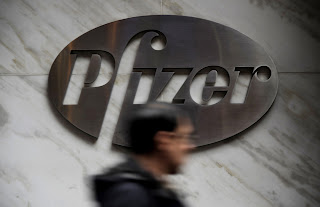Pfizer Pipeline Bet to Show If Drugmaker Has Blockbuster
Pfizer Inc. (PFE)’s Chief Executive Officer Ian Read will find out in the next six months whether his plan to shed units and focus on new drugs will pay off, with three top products awaiting approval or key data.
U.S. Food and Drug Administration regulators will rule on Pfizer’s blood thinner and arthritis pill by June and August, respectively. The New York-based company plans to report data from the last of three phases of clinical tests on bapineuzumab, its experimental Alzheimer’s treatment, in the third quarter.
In the meantime, Read is buying back shares, arguing that Pfizer’s best investment of cash is the drugmaker’s stock. “There’s always a discontinuity between what the street sees and puts in our share price for our pipeline, and what we can see in our pipeline,” Chief Financial Officer Frank D’Amelio said today in a telephone interview.
Pfizer is trying to move past its dependence on Lipitor, the best-selling cholesterol pill that lost marketing exclusivity last November. Investors are awaiting more clarity on how Read will divest the company’s animal health unit, scheduled to be announced by July. The world’s biggest drugmaker said last month it would sell its infant nutrition unit to Vevey, Switzerland-based Nestle SA (NESN) for $11.9 billion.
Read also is reorganizing the company’s brand-name drug business to separate it from what Pfizer calls the “established products” line, including medicines that have gone off-patent as well as emerging markets sales.
‘Get a Feel’
“I’ve got to get a feel for how the two business units look and feel and run,” Read said today in a telephone interview. “I’ve got to get a feel for how the innovative core strengthens its pipeline.”
Read said he hasn’t yet considered splitting brand-name and established products into different companies. “It’s far too premature to talk about the businesses being separate.”
Tony Butler, an analyst with Barclays Capital in New York, said he doesn’t forecast an increase in revenue for Pfizer from now until 2020.
“What you’re left with after the divestiture is a pharmaceutical business that will be smaller, but has a number of challenges from a growth perspective,” Butler said today in an interview with Bloomberg TV. “New products drive revenue change, and while Pfizer does have some, they’re not enough.”
Profit Falls
Earlier today, the New York-based company reported first- quarter profit fell 19 percent after revenue from Lipitor declined because of generic competition. The company trimmed its 2012 forecast after the sale of the nutritional unit.
Net income dropped to $1.79 billion, or 24 cents a share, from $2.2 billion, or 28 cents, a year earlier. Earnings excluding one-time items beat by 2 cents the 56-cent average of 19 analystsestimates compiled by Bloomberg.
Pfizer declined less than 1 percent to $22.78 at the close in New York. The shares have gained 8.6 percent in the past 12 months.
Pfizer plans to release data on its Alzheimer’s treatment, bapineuzumab, in the third quarter of this year, Olivier Brandicourt, president of primary care, said today on a conference call discussing the earnings.
Pfizer, Johnson & Johnson (JNJ) and Elan Corp. (ELN) are partners on the Alzheimer’s drug. One of the two studies Pfizer is conducting has finished, and another will be done in several months, Brandicourt said. And on May 9, a panel advising the FDA will make recommendations on tofacitinib, Pfizer’s experimental pill to treat arthritis.
No Surprises
“There’s nothing they’ve done that’s been shocking or concerning to us,” Geno Germano, Pfizer’s president of specialty care, said of the regulators’ review. The FDA is scheduled to rule on tofacitinib by Aug. 20, and the drug if approved may be worth $1.5 billion to Pfizer this year, John Boris, an analyst for Citigroup, said in a note to clients.
Eliquis, a blood thinner developed with Bristol-Myers Squibb Co., will get an FDA decision by the end of June. The drugmakers will split sales from the pill, which Tim Anderson, an analyst with Sanford C. Bernstein & Co. in New York, estimates at $2.5 billion annually by 2015.
Pfizer said full-year profit will be $1.23 to $1.38 a share, compared with a previous forecast for as much as $1.52. The change was from sale of company’s the nutrition unit, the drugmaker said.
Revenue Decline
Revenue fell to $15.4 billion from $16.5 billion a year earlier, hurt by a 25 percent drop in sales from its pharmaceutical business because of the loss of Lipitor’s U.S. patent protection. The sales decline was made up for with a 7 percent cut to costs, excluding the impact of foreign exchange, part of Read’s plan to make the company more efficient.
Pfizer also said that it took a $450 million charge after agreeing to settle a lawsuit with Brigham Young University over credit for development of the arthritis painkiller Celebrex.
Sales of Lipitor, still Pfizer’s best-selling drug, fell 42 percent to $1.4 billion. Those declines were led by a 71 percent fall in the U.S., after the cholesterol pill lost patent exclusivity in November.
Read said last week that Pfizer is deciding how it will shed the animal health unit, which makes drugs for pets and livestock and had sales of $4.18 billion last year. The drugmaker is likely to divest the unit in a combined initial public offering and share swap, he said, in which Pfizer would sell some stock on the open market and exchange a portion of Pfizer shares for stock in the new company.



Comments
Post a Comment